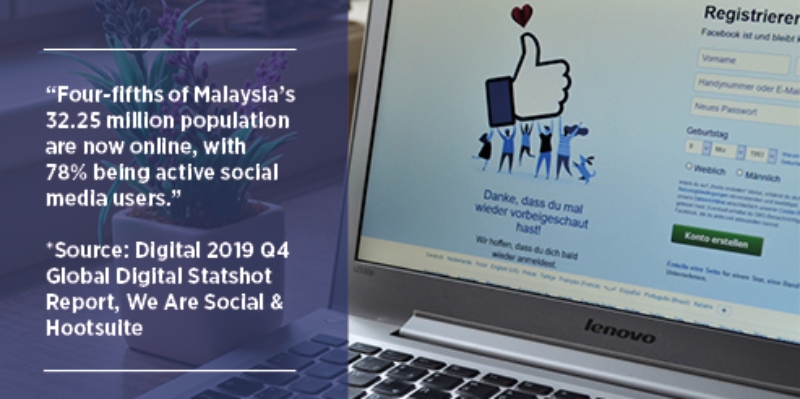The Inside Story of Marketing & Digital in Malaysia

According to We Are Social’s new Digital 2019 Q4 Global Digital Statshot report produced in partnership with Hootsuite, a wealth of new data has contributed to impressive growth across various aspects of digital across the globe. The number of internet users around the world is rapidly approaching 4.5 billion, with the report estimating that implementation of 5G networks will create new digital milestones as mobile data usage reaches unprecedented speeds.
In Malaysia, four-fifths of the country’s 32.25 million population are now online, with 78% being active social media users. These statistics led to Malaysia being ranked 26th in the IMD World Digital Competitiveness Ranking in 2019 with a 79% Internet penetration rate – one of the highest in the Southeast Asia region. There have also been promising moves by Malaysia’s government to keep this momentum going, such as the two key initiatives announced to further boost Malaysia’s digital economy that include developing more tech talent.

The increasing proliferation of the internet alongside the global movement towards digital transformation and automation has undoubtedly disrupted even the most traditional marketing roles. As marketing in Malaysia continues to progress, business leaders are expected to significantly grow their teams and strategically position their hiring to remain ahead of competition from other regions. The demand for creative professionals and traditional marketers is expected to grow strategically, with ‘out of the box’ thinking being high on the priority list amongst employers in the sector.
Market Overview: Slower hiring amidst challenging business conditions
With digital marketing now an integral part of any industry, the need for professionals with suitable skills has become a priority for most businesses. However, the rapid evolution of digital marketing has created a “digital disconnect” where professionals are yet to reach the expected level of digital skillsets. This has led to a shortage of suitable talent in the technology jobs market, including digital marketing technology. In addition to this, a slowing global economy has resulted in a relatively job short market as well, as companies cut back on new headcount in preparation for a conservative business outlook. Candidates are also becoming more risk adverse for this reason and are wary of jumping roles amidst concerns of job security.
But this is bound to pick up, says Harish Pillai, Consultant at Hays Malaysia. “While the overall market is currently both job short and candidate short, with most of the hiring we are seeing now being replacement-based, things are looking brighter for 2020. We can expect an uptick between April-July as this is when new budgets are released, and most new projects or campaigns would be underway. We are already seeing growing interest from the education, automotive and FMCG sectors,” he says.
Additionally, there has been positive growth in marketing hires within retail, telecommunication and manufacturing sectors, which act as an underlying statement that the valuation of marketing professionals, particularly those with digital skills, is on the rise. This has given job seekers more confidence in their salary expectations, while organisations maintain their salary offerings in tandem with the value a candidate can bring through their skill sets.
Skills in Demand: Digital skills, creativity and strategic advisory
The top skills in demand fall within the areas of content creation, branding strategies and consumer data marketing. “More companies are realising the importance of collecting data, and that their ability to drive market growth hinges on the depth of their ability to translate consumer insights and branding initiatives into effective action. This has driven up demand for candidates working in the areas of CRM, campaign analysis and marketing operations,” Harish shares.
The sector is seeing an intensified demand for candidates with knowledge in content strategy, creative campaigns and search engine optimization. These skills will allow marketing professionals to leverage on digital channels and improve traffic, alongside a host of data-related activities that are gaining mounting importance.
However, since the demand for tech-savvy marketing professionals currently outweighs supply, candidates working in the areas of CRM, campaign analysis and marketing operations remain highly sought after and can expect to receive premium offers.
For mid-senior level marketing candidates, technical and industry-specific skills such as budgeting, or managing campaigns have become a baseline, with soft skills emerging as a new differentiator amongst employers. Being able to creatively think out of the box and strategically advise the business tops this list. “Managers and senior managers are expected to be leading instruments who can drive productivity and efficiency in a company,” Harish explains, “A lot of clients want candidates who can not only take orders and execute, but also advise a company on how it can be doing better – be it through partnerships, sponsorships, or just ideas that can save costs.”
Owing to social media’s increasingly popularity in recent years, more companies in Malaysia are looking for social media managers to leverage these platforms. Within traditional marketing brand managers, marketing managers (branding and product), PR and communication managers are the most in demand.
Commenting on pay scales, Harish explains that while the market is currently competitive, salary offers are usually largely dependent on industry rather than role. “While most marketing professionals are well compensated and offered benefits such as annual bonuses and various allowances, pay scales do vary with industry. This increases in seniority. For example, a CMO of a global FMCG company could earn up to twice the amount a CMO of an education company would.”

Company culture fit vital for senior hires; digital promotions on the rise
Finding the right culture fit has become increasingly important for marketing candidates in Malaysia, prompting companies to ramp up their initiative to highlight company culture. This includes working with their recruitment agencies, as Harish explains, “A lot of organisations work with agencies these days and count on them to help deliver their brand image and message the right way. So we also carry the responsibility of propagating their employer branding.”
Other popular methods of attracting candidates include career events, open days, and orientation days. “Some companies also leverage creative collaborations. For example, a luxury car brand may team up with the F1 to hold an event during which they also talk about what it is like to work there,” shares Harish. Digital platforms like social media have also become the norm to promote company culture, owing to their ability to generate views across a wide demographics. “This can be as simple as advertising an MOU, a 4-day work week or even a company-sponsored tour to Europe for example. Even small snippets like this could help promote a company’s work culture.”
Things get interesting for senior candidates says Harish, who often already know the biggest brands in marketing, including their top management and work culture. “While brand manager candidates, for example, may have more concerns about culture, team, job scope etc, this is less common for say a head of marketing or CMO. At these levels, pay grades are leveled out as well and it becomes more about the brand and whether this is the company they want to work for.”
Interview processes are also becoming more flexible and open, which falls in line with the demand for creative thinking. “Employers have been refreshing their techniques. Interview processes are now more like a first day at work where they run candidates through case studies and discussions which allows them to showcase their thought processes, “ says Harish. More companies are also encouraging their employees to upskill, often offering additional allowances or courses to facilitate this.
Looking to the future, Harish believes that while digitalisation is certainly transforming marketing roles, the need for a human touch will safeguard marketing as a whole. “A lot of jobs are being replaced by digital and automation and there are areas where traditional marketing may no longer be a priority need. But while AI and robotics can mimic human behavior and thinking, when it comes to purchasing, nobody can relate better than another human being. A meaningful advertisement, for example, that focuses on family or relationships, can captivate a human being. An AI may not be able to do this, but the space is certainly one to watch over the next decade.”
The Inside Story in Malaysia
Accountancy and Finance (2024)
Banking and Financial Services (2023)
Hays Research
DNA Series
Uncovering the DNA of the Future Workplace

